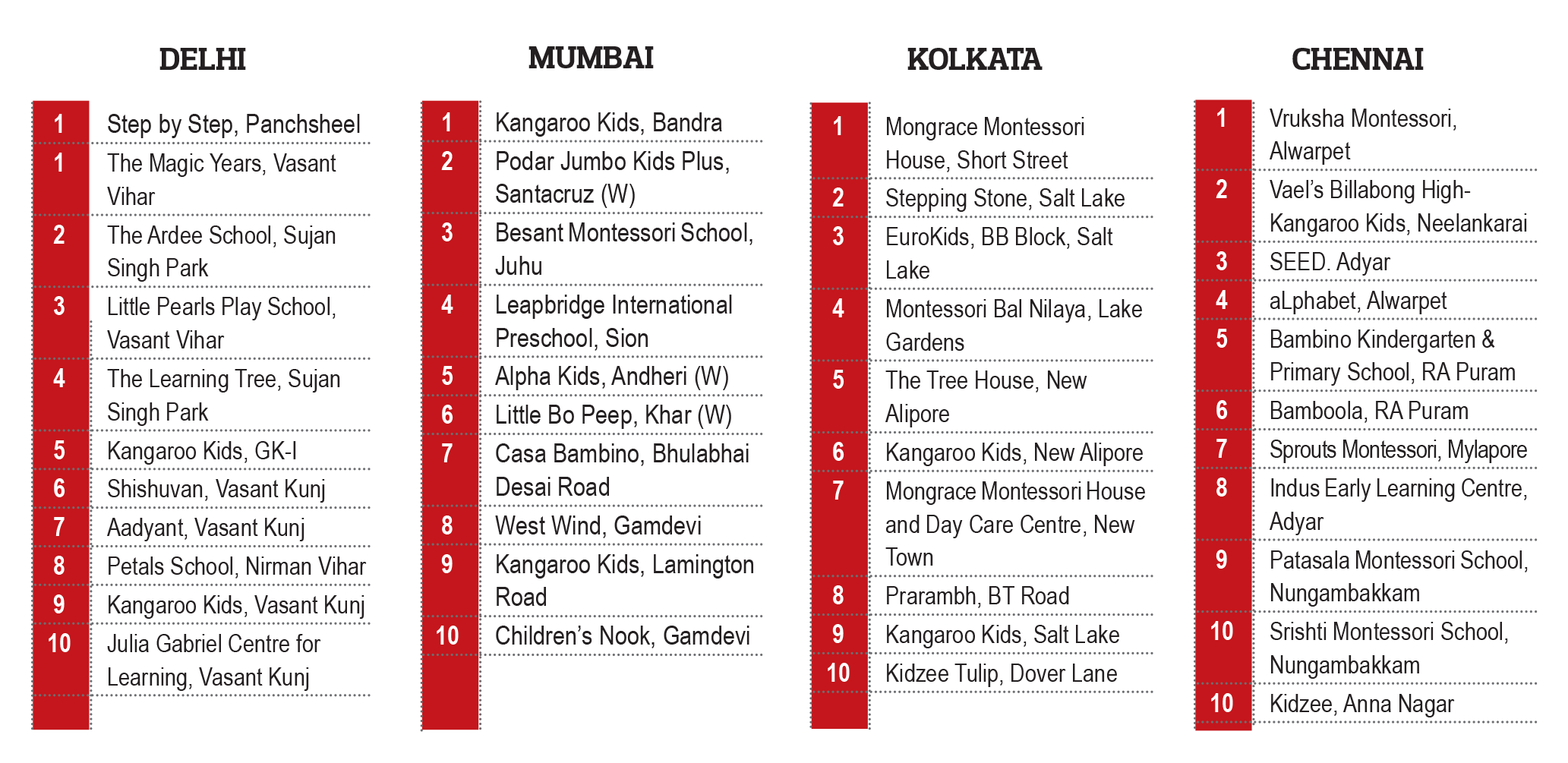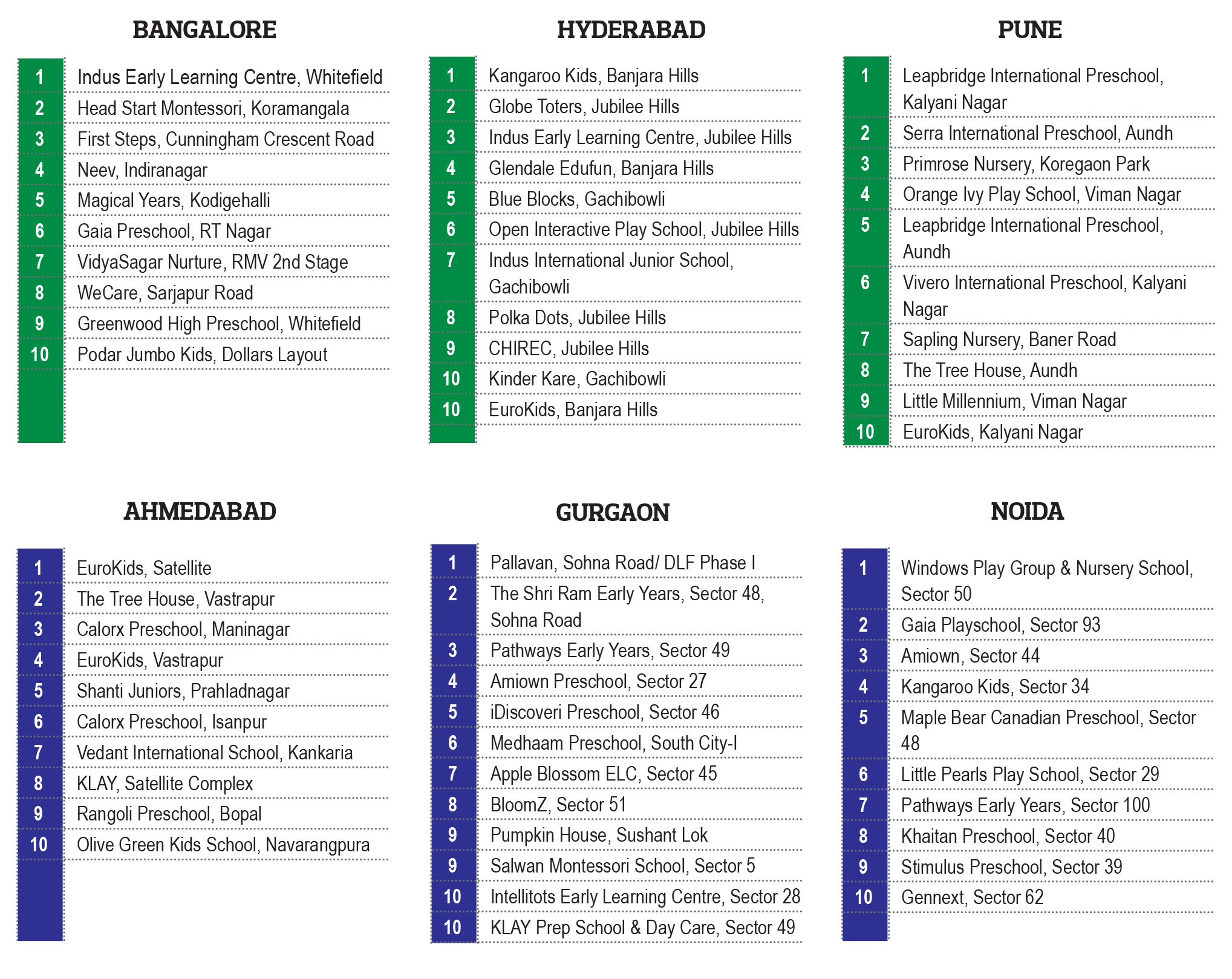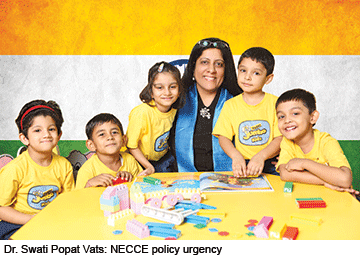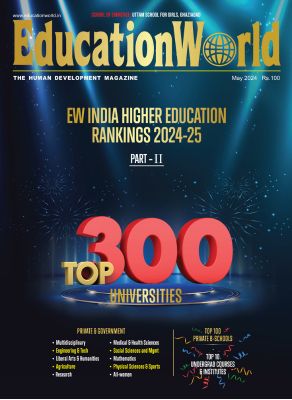Educationworld India Preschool Rankings 2014
Since September, 200 C fore field researchers have quizzed 2,332 SECA (socio-economic category A) young parents and 795 principals and teachers to rate 173 unitary pre-primaries in ten cities countrywide across ten parameters of early childhood care and education excellence. Here are the Educationworld India Preschool Rankings for the year 2014:

 Astonishing but true. Nobody seems to give a jot that almost half of India’s 140 million children under age five are likely to suffer brain damage and stunting due to chronic early childhood malnutrition. Even as the country’s newly-elected machismo prime minister Narendra Modi powwows with leaders of ASEAN and OECD countries where the incidence of child neglect and malnutrition is a historical memory, the shameful truth testified by the UNDP’s Human Development Report 2014, that 48 percent of India’s infants are severely under-nourished and in grave danger of physical and cognitive damage, is being glossed over by the self-serving establishment, jingoist media, and uncaring middle class.
Astonishing but true. Nobody seems to give a jot that almost half of India’s 140 million children under age five are likely to suffer brain damage and stunting due to chronic early childhood malnutrition. Even as the country’s newly-elected machismo prime minister Narendra Modi powwows with leaders of ASEAN and OECD countries where the incidence of child neglect and malnutrition is a historical memory, the shameful truth testified by the UNDP’s Human Development Report 2014, that 48 percent of India’s infants are severely under-nourished and in grave danger of physical and cognitive damage, is being glossed over by the self-serving establishment, jingoist media, and uncaring middle class.
Despite a spate of neuroscience studies in the US and Scandinavian countries having conclusively established that children’s cognitive faculties are almost 90 percent developed by age eight, India’s omniscient education planners and policy formulators were in the dark about early childhood care and education (ECCE) until recently. Under severe pressure from private sector educators and not least from EducationWorld which started rating and ranking India’s most progressive independent/unitary pre-primaries in 2010 and also began staging the annual EducationWorld Early Childhood Education Global Conferences, amidst reports that the neighbouring People’s Republic of China intends to invest a humungous $8 billion (Rs.48,000 crore) in ECCE over the next two years, belatedly the babus and behenjis in the Central government’s women and child development ministry placed ECCE on the national development agenda. A National Early Childhood Care and Education (NECCE) Policy was drafted last year and approved in September 2013 by the Congress-led UPA-II government at the fag-end of its undistinguished second quinquennium (2009-14).
The major policy recommendation of the NECCE is to transform all 1.6 million anganwadis — child and lactating mothers’ nutrition centres established under New Delhi’s Integrated Child Development Services programme (1975) — into ECCE centres and prescribe infrastructure, quality and other benchmarks for pre-primaries. But with the Congress and its allies routed in General Election 2014, and the BJP lumbered with a lunatic fringe of sangh parivar intellectuals whose stated intent is to revert to ancient India’s gurukul system for primary education, and to inject Hindu mythology and morality into school texts, the chances of the 21st century NECCE policy draft being applied in the country’s 1.6 million anganwadis and rolled out nationally, have dimmed considerably. 
The signs are not good. Instead of promoting pre-primary schools and/or helping Central government anganwadis to become full-fledged ECCE centres for children under six years of age, several state governments, led by Tamil Nadu, have issued closure notices to private preschools on the ground that they are in breach of the Right to Free & Compulsory Education (RTE) Act, 2009. This is completely retrograde because the RTE Act is not applicable to pre-primaries. As soon as the new government was sworn-in in Delhi, we sent letters to the Union minister of women and child development Maneka Gandhi and prime minister Narendra Modi, incorporating our suggestions for improving the NECCE Policy draft. But thus far, we haven’t received any response. Therefore once again on Children’s Day, we resent our letters. We have to be optimistic that the new government will give early attention to a new, improved NECCE policy which is a matter of utmost urgency,” says Dr. Swati Popat Vats, founder-chairperson of the Early Childhood Association (estb. 2010) which has a membership of over 1,000 private pre-primaries countrywide. A sociology, law, and education postgraduate of Bombay University, Popat Vats is also the founder-president of the Podar Jumbo Kids network of 167 pre-primaries countrywide.
Also read: Early childhood care & education – Swati Popat Vats
However regardless of policy twists and turns, indolence of the educracy and machinations of faux intellectuals of the sangh parivar, the editors of EducationWorld are entirely convinced that universal professionally-administered ECCE is a — and perhaps the most — vital missing link in post-independence India’s rundown and discredited K-Ph D education system. We wholly subscribe to the nostrum of Nobel laureate economist James Heckman that the socio-economic returns are higher on every rupee invested in ECCE than on rupees invested later in the education continuum.
Thus as we have been doing every year since 2010, in September we commissioned the Delhi-based market research and opinion polling company Centre for Forecasting and Research Pvt. Ltd (C fore, estb. 2000), which has conducted all schools and pre-primaries ratings and ranking surveys for EducationWorld, to sound informed public opinion to rate and rank pre-primaries in ten cities countrywide, where professionally administered ECCE is appreciated and valued.
Accordingly, since September 200 C fore field researchers have quizzed 2,332 SECA (socio-economic category A) parents with at least one child enrolled in a pre-primary school, and 795 preschool principals and teachers to constitute a respondents’ sample database aggregating 3,218 individuals countrywide. “Every respondent was shown a list of pre-selected pre-primaries in her city. Respondents were then asked to rate the schools known to them on a ten point scale — except on the parameter of teacher competence which is given double weightage — against ten parameters, including innovative teaching, infrastructure, individual attention to children, leadership/management quality, safety and hygiene etc. Preschools assessed by less than 30 respondents in each city are not included in the league tables. The scores awarded to schools under each parameter were aggregated to rank pre-primaries in each of the selected cities,” says Premchand Palety, the founder-director of C fore which lists well-known corporates and organisations including Hindustan Times, Asianet, Samsung and Microsoft among its clients.
In the pages following, we present league tables of the country’s most respected unitary preschools including the scores awarded to them by the informed sample respondents under each parameter. Our expectation is that the league tables will aid and enable parents to choose the most appropriate school for their children, that preschool principals and teachers will learn what’s expected of them, and the lay public will become aware of the value of professionally-administered early childhood care and education.
To read the EW India Preschool Rankings 2013 please visit




























